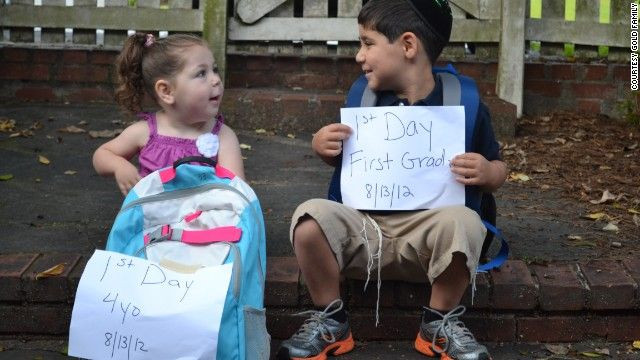Jewish Genetic Diseases Could See Prevention With Early Screening And Education

Despite little discernable explanation, a range of Jewish genetic disorders is displayed more commonly among Ashkenazi Jews — diseases that could be prevented given adequate screening during pregnancy and education about parent background. Given the increased prevalence, some parents have begun pushing for standardized screening measures among those most at risk.
Ashkenazi Jews face increased risk for cystic fibrosis, congenital deafness, Tay-Sachs, Parkinson’s disease, and mucolipidosis IV (ML4), among others. While some, like Tay-Sachs, have seen near eradication in recent decades, others like ML4 continue to beleaguer Ashkenazi parents who fear they may be carriers of genetic diseases. Thankfully, new options are sprouting up as awareness builds for the unique set of disorders.
The JGDC And A Girl Named Eden
Consider Randy Yudenfriend Glaser, co-founder of the Jewish Genetic Disease Consortium (JGDC) and whose daughter, Lauren, suffers from ML4, rendering her unable to speak and in need of constant care. Yudenfriend Glaser’s son Jonathan also suffers from the disease — a screening during pregnancy failed to catch the genetic disorder — making caring for children with such illnesses a top priority in her life.
"The reason we’re so passionate about it is that these diseases are not just children that look funny or have a learning disability,” she told Jewish News One. “Many of these diseases such as Tay-Sachs and Canavan disease, children die at very young ages. And they’re awful deaths. They regress, they decompensate, many of them become blind, they need feeding tubes; there are hospitalizations. Its really awful."
Many of the diseases associated with Jewish genetic diseases have no cure, and sometimes — such as with ML4 — no treatment even, making proactive screening the first line of defense in avoiding complications.
Much like Yudenfriend Glaser’s children, 4-year-old Eden Gold suffers from ML4, a rare genetic condition that affects motor skills and sight. Doctors say Eden will be blind by age 12. Her parents, Caroline and Randy Gold, have taken Eden’s example and used it as a platform to push for standardized screening methods.
“We decided to make sure that the tragedy of Eden's story doesn't happen to another family,” Randy told CNN. The Golds used their knowledge of ML4 and associated genetic diseases to inform their community, parents, and even doctors about the increased risks faced by Ashkenazi Jews. The family eventually took their campaign to the insurance companies and medical labs, asking for universal practices in screening methods to lower cost and open access.
Their efforts soon catalyzed the Marcus Foundation and Emory University School of Medicine Web-based screening program JScreen, which helps identify the 19 most common Jewish genetic diseases, including ML4. The program began running this month. JScreen offers genetic testing to both Jewish and non-Jewish parents, in the event that one partner is of a different background or is unsure of his or her ancestry.
Customers of JScreen conduct an in-home saliva test that comes as part of a kit, which the customer can mail back to the lab for results. In roughly four weeks’ time, he or she will know if his or her genes pose any risk to a future child. Kits cost $99 with insurance (without it, $599).
Planning Ahead
In the event that an underlying disorder shows up, couples effectively have two choices to prevent a future disease among their children, according to Rabbi Deborah Bravo, who works alongside the JGDC as a marriage consultant. Couples can either opt for adoption or selective in vitro fertilization (IVF), so the doctor can guarantee no disease will be present because of parent ancestry.
Unfortunately, if a couple finds out during pregnancy that they are carriers, nothing can be done but terminate the pregnancy or deliver the child — something that Rabbi Bravo says has nuanced her involvement with the JGDC.
“When you stand under the Chupa and you’re wed to your partner you’re there for good and for bad. And we hope and pray that most of it is good, but it is important to know how to deal with the bad as well,” she told Jewish News One. “So I definitely have taken that role much more seriously in the past couple of years as I have come in contact with it more and realized the importance that we as clergy can have in educating our couples."
The capacity for awareness and prevention is growing. When the Golds got married in 2004, scientists could test for 16 genetic diseases. Now that number is up to 19. At the same time, JScreen wants consumers to have reasonable expectations upon ordering a kit; not all diseases can be tested for, and so education on the kits themselves still presents an issue.
Now better armed with their risk factors, Randy and Caroline Gold welcomed a new, healthy baby girl to their family last year. They made sure to receive pre-implanting testing and IVF to ensure that she wouldn’t face the same hardships with ML4 as her big sister. But for all the roadblocks Eden’s disease has brought them, the Golds say she has brought them even more joy.
"Eden is here to save lives,” Randy said. “And if that's what she's here to do, there is no life more noble than that.”
Published by Medicaldaily.com



























